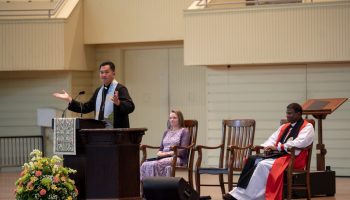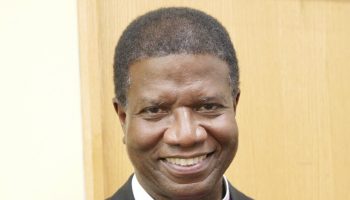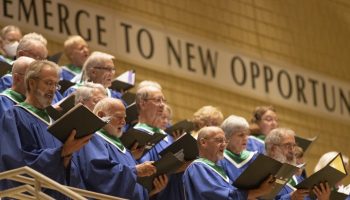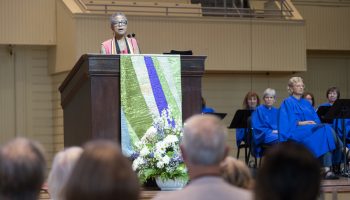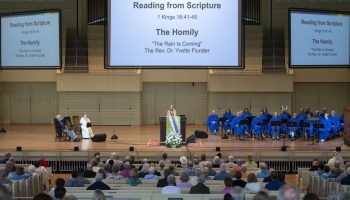“Elijah put aside his preconceived notions of how God works in order to receive God’s blessings — even if those blessings came from ravens,” said the Rev. Traci deVon Blackmon on Thursday, July 9, on the CHQ Assembly Video Platform.
Her sermon title for the 9:15 a.m. EDT morning devotional was “In Defense of the Ravens.” The scripture text was 1 Kings 17:1-7 (NRSV).
“Now Elijah the Tishbite, of Tishbe in Gilead, said to Ahab, ‘As the Lord the God of Israel lives, before whom I stand, there shall be neither dew nor rain these years, except by my word.’ The word of the Lord came to him, saying, ‘Go from here and turn eastward, and hide yourself by the Wadi Cherith, which is east of the Jordan. You shall drink from the wadi, and I have commanded the ravens to feed you there.’ So he went and did according to the word of the Lord; he went and lived by the Wadi Cherith, which is east of the Jordan. The ravens brought him bread and meat in the morning, and bread and meat in the evening; and he drank from the wadi. But after a while the wadi dried up, because there was no rain in the land.”
Elijah entered the story of Israel at a time when the people had turned away from the true God and turned to idolatry. “They were in the midst of pagan worship and had abandoned God,” Blackmon said.
Elijah “moved from obscurity to the front and center on the stage of theological history,” Blackmon said. “There would be no rain until he said so. He was the prophet and cause of the drought.”
But at the height of his new fame, God told Elijah to go and hide by the Cherith, a brook to the east of the Jordan.
“God wanted to teach him the value of the hidden life,” said Blackmon. “God decided Elijah had enough fame and excitement and it was time to go to the Cherith, which means cut off, cut up or cut away.”
The waters of the brook Cherith were not in unlimited supply. If there was no rain, the brook would not be replenished; it would run dry.
“God did not send Elijah to the Jordan River, a place of unlimited supply,” she said. “God left Elijah in the drought that he caused and does not give Elijah a pass.”
What are your Cheriths? “They could be sick rooms, disappointed hopes, the loss of loved ones, divorce, the lack of finances. Have I hit your brook, yet?” she asked the virtual congregation.
“Those who stand with God will spend time away in solitude as the crowds have ebbed away,” she said.
Blackmon noted that in 1 Kings 17:4, the emphasis is on the word “there.” God had commanded the ravens to feed Elijah “there.”
She said, “Elijah might have wanted to be somewhere else, but God wanted him there and provided for him there. God had already provided for Elijah before he even arrived.”
Blackmon told the congregation that wherever “there” is, to not be dismayed — because God will provide what is needed. “Have you reached your ‘there’ yet? God will provide.”
God will use ravens in your life to bring you resources. Stop turning your nose up to those who don’t think like you, look like you, act like you. Consider the ravens who are chosen for a time like this.”
Elijah was sent away for his protection and to train him to trust in God. He had to trust that the brook would keep flowing. He had to trust the means by which God sent food — ravens, who were considered unclean and ate carrion; or, as Blackmon bluntly put it, “dead things”
“That is the hard part,” she said. “Are you willing to move, set aside preconceived notions of how God works, to set aside what you have learned and enfleshed to receive blessings however they come?”
Ravens brought meat and bread to Elijah every morning and evening. “Everything he ate came to him from the beak of an unclean animal,” she said. He had to put away religious ideas and rhetoric or starve.
There are people today who are spiritually starving, Blackmon said, “who don’t want to receive a word from a chosen vessel. They don’t want a word from a woman, a gay person, a Black person. They think that protesters yelling about freedom and confronting the police can’t have a word to hear.”
She continued, “God will use ravens in your life to bring you resources. Stop turning your nose up to those who don’t think like you, look like you, act like you. Consider the ravens who are chosen for a time like this.”
The Rev. Carmen L. Perry, pastor of the Hurlbut Memorial Community United Methodist Church in Chautauqua Institution, presided from the Hall of Christ. Joshua Stafford, interim organist for Chautauqua Institution, played the Tallman Tracker Organ. Michael Miller, a Chautauqua Opera Apprentice Artist, served as vocal soloist. All the music, except the hymn, was from “Elijah” by Felix Mendelssohn. The organ prelude, performed by Stafford, was “O Rest in the Lord.” Miller sang the hymn, “The Raven He Feedeth.” The anthem was “O Come, Every One that Thirsteth.” Stafford played “Overture” for the postlude. This program was made possible by the Mr. and Mrs. William Uhler Follansbee Memorial Chaplaincy and the Robert D. Campbell Memorial Chaplaincy Fund.


